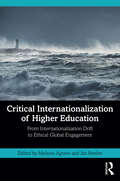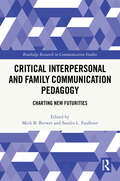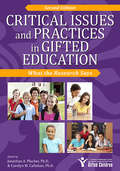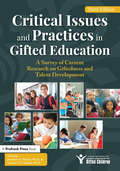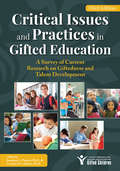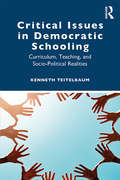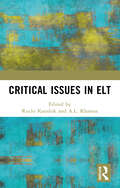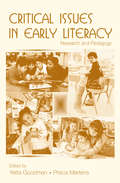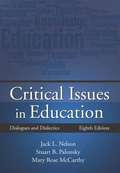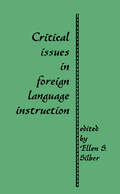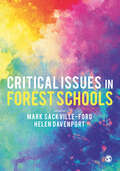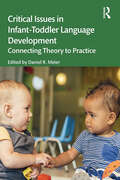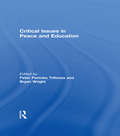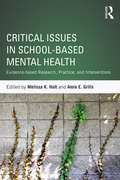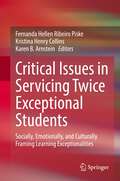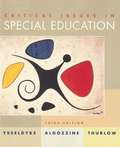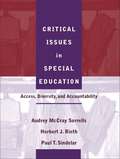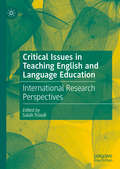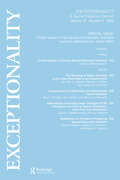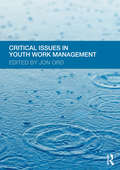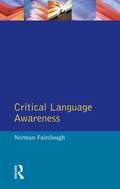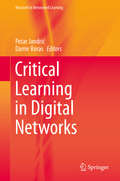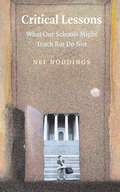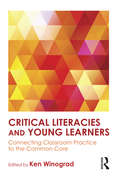- Table View
- List View
Critical Internationalization of Higher Education: From Internationalization Drift to Ethical Global Engagement
by Jos Beelen Melanie AgnewThis edited collection explores ethical global engagement in higher education internationalization. Framed by organizational change theory and critical internationalization approaches, chapter authors discuss the systemic inequities in who is served and for what purposes, while also providing new insights on what drives the why, what, and how of internationalization. This volume features contributions from scholars across disciplines, presenting original research and theoretical insights on topics within higher education internationalization, including teaching and learning, mobility, university service, collaborative partnership, student recruitment, evaluation, and leadership. Ultimately, this volume provides higher education leaders, professionals, and graduate students with ethical policies and practices that champion internationalization of higher education for its capacity to meet contemporary global challenges while also maintaining its foundational educational mission.
Critical Interpersonal and Family Communication Pedagogy: Charting New Futurities (Routledge Research in Communication Studies)
by Sandra L. Faulkner Mick B. BrewerThis volume establishes critical interpersonal and family communication pedagogy (CIFCP) as a distinct academic area of inquiry, highlighting the intersections of identity, power, culture, pedagogy, and interpersonal and family communication concepts, theories, and methods.This practical, theoretical, and aspirational collection by interpersonal and family communication (IPFC) scholars and teachers shines a spotlight on, through a diversity of methods, some of the ways that power both emanates within the classroom and informs intellectual instruction. Providing examples that connect critical theories and concepts with topics common in IPFC classrooms, such as conflict, relational tension, disclosure, listening, and family dynamics, the book illustrates how critical concepts can be uniquely addressed and unpacked in IPFC classrooms through a variety of assignments, teaching activities, and discussion prompts, and promotes and normalizes the ongoing reflexive practices of IPFC instructors.This book will interest academics and upper-level students working in the areas of Critical Methodology, Interpersonal Communication, Family Communication, and Relationship Science.
Critical Issues and Practices in Gifted Education
by Carolyn Callahan Jonathan PluckerCritical Issues and Practices in Gifted Education: What the Research Says is the definitive reference book for those searching for a summary and evaluation of the literature on giftedness, gifted education, and talent development. The book presents more than 50 summaries of important topics in the field, providing relevant research and a guide to how the research applies to gifted education and the lives of gifted children. This second edition updates every topic with new research and introduces several critically important topics such as cluster grouping, Response to Intervention, programming standards, the Common Core State Standards, educational leadership, and legal issues. This book provides an objective assessment of the available knowledge on each topic, offers guidance in the application of the research, and suggests areas of needed research.
Critical Issues and Practices in Gifted Education: A Survey of Current Research on Giftedness and Talent Development
by Jonathan A. PluckerCritical Issues and Practices in Gifted Education is the definitive reference for a summary and evaluation of the literature on giftedness, gifted education, and talent development. This third edition:Presents more than 40 summaries of important topics in the field.Features updates to all topics.Introduces new topics, including neuroscience and the roles of leaders in the field.Dives into the latest research.Explores how the research applies to gifted education and the lives of gifted learners.This book also provides an objective assessment of the available knowledge on each topic, offers guidance in the application of the research, and suggests areas of needed research.
Critical Issues and Practices in Gifted Education: A Survey of Current Research on Giftedness and Talent Development
by Ph. D. And Carolyn M. Callahan Jonat PluckerCritical Issues and Practices in Gifted Education is the definitive reference for a summary and evaluation of the literature on giftedness, gifted education, and talent development. This third edition:Presents more than 40 summaries of important topics in the field.Features updates to all topics.Introduces new topics, including neuroscience and the roles of leaders in the field.Dives into the latest research.Explores how the research applies to gifted education and the lives of gifted learners.This book also provides an objective assessment of the available knowledge on each topic, offers guidance in the application of the research, and suggests areas of needed research.
Critical Issues in Democratic Schooling: Curriculum, Teaching, and Socio-Political Realities
by Kenneth TeitelbaumFocusing on a wide range of critical issues, this book provides a comprehensive analysis of the linkage of different educational ideas, policies, and practices to a commitment for democratic schooling. Informed by significant, interdisciplinary research, as well as by his own extensive professional experiences as a teacher, professor, department chair, and dean, Teitelbaum examines contemporary concerns related to three broad areas: 1) teaching and teacher education; 2) curriculum studies; and 3) multiculturalism and social justice. His approach is to integrate the current and the historical, the practical and the theoretical, the technical and the socio-political, and the personal and the structural. With this volume, Teitelbaum considers how schools should be organized and funded, what they should teach and to whom, the role that teachers, students, and parents should play in school life, and the need and prospects for schools and teacher education programs that foster meaningful learning, critical reflection, and social justice.
Critical Issues in ELT
by Ruchi Kaushik A. L. KhannaELT, a vast and growing field of research, has now moved beyond primary concerns related to developing learners’ proficiency in the language and designing curricula, syllabi, materials and assessment tools. It is witnessing rapid development towards de-centralizing and de-elitizing English, promoting multilingual approaches for teaching English and bridging the gap between language-in-education policies and practices.Critical Issues in ELT compiles research papers by linguists, language teachers, and English language teaching professionals to present contemporary debates on critical issues related to English language teaching, primarily in India. The subject matter of this book includes a variety of articles based on empirical data. It discusses the challenges facing ELT today and also includes papers discussing theoretical positions/frameworks/issues in ELT, classroom-based action research projects, and personal narratives.Print edition not for sale in South Asia (India, Sri Lanka, Nepal, Bangladesh, Pakistan or Bhutan)
Critical Issues in Early Literacy: Research and Pedagogy
by Yetta Goodman Prisca MartensThis volume adds in important ways to understanding the power and complexity of the forces in the lives of children that impact their literacy learning. The critical issues presented emerge from interpretivist research and thinking practices that are constructivist in nature. The chapters by researchers, teacher researchers, teacher educators, and teachers are antidotes to the present political context in which political agendas are being used to define literacy, literacy teaching and learning, and literacy research in narrow ways. Providing a rich source of information about how young children come to know reading and writing as a tool of communication in a range of social and cultural contexts, this book:*presents current research and thinking in the field;*documents research that is currently being ignored by many who make decisions about children’s learning;*values who children are and what they bring with them to school;*provides a useful tool for advocacy and for social action toward improving education in ways that can make a difference in the lives of young children; and*raises thoughtful issues for discussion. Critical Issues in Early Literacy is essential reading for early childhood teachers and prospective teachers, for teacher educators, for literacy researchers (including teacher researchers), for special educators, for those working with English-language and foreign-language learners, and for early childhood education administrators, advocates, and policy makers.
Critical Issues in Education: Dialogues and Dialectics, Eighth Edition
by Jack L. Nelson Stuart B. Palonsky Mary Rose McCarthyFew subjects engender more strongly held beliefs and contrary views than education. The outcomes of debates over education and educational reform impact all citizens. Media coverage of these controversies is sometimes shallow and one-sided, fostering the need to develop critical thinking skills. These skills in turn open opportunities for personal growth, joining the public debate, and helping others participate in critical discussions. <P><P>The authors of Critical Issues in Education present two opposing positions for each of sixteen different hot-button issues, including multiculturalism, school finance, charter schools, teacher evaluation, cyberbullying, and gender equity. Prospective teachers will find the authors' approach eye-opening and stimulating. Ideally, they will teach these valuable skills to their students, who will prosper academically and personally from understanding and considering diverse viewpoints.
Critical Issues in Foreign Language Instruction (Source Books on Education #22)
by Ellen S. SilberFirst Published in 1991. Routledge is an imprint of Taylor & Francis, an informa company.
Critical Issues in Forest Schools
by Mark Sackville-Ford Helen DavenportForest School continues to grow and develop, both in the UK and internationally. Literature and research in the field tend to document this growth, while this book takes a novel approach to the Forest school conversation, taking a critical look at the various tensions and difficulties that surround Forest School practice. The editors, together with chapter authors drawn from the fields of academia and practice, form an experienced voice, encouraging the reader to reflect upon, question and explore complex areas of Forest School practice.
Critical Issues in Forest Schools
by Mark Sackville-Ford Helen DavenportForest School continues to grow and develop, both in the UK and internationally. Literature and research in the field tend to document this growth, while this book takes a novel approach to the Forest school conversation, taking a critical look at the various tensions and difficulties that surround Forest School practice. The editors, together with chapter authors drawn from the fields of academia and practice, form an experienced voice, encouraging the reader to reflect upon, question and explore complex areas of Forest School practice.
Critical Issues in Infant-Toddler Language Development: Connecting Theory to Practice
by Daniel R. MeierDesigned to help students and educators make critical theory-to-practice connections, this essential volume provides a deep yet accessible approach to infant and toddler language and literacy education. Centered around four foundational topics—language, interaction, and play; language and culture; multilingualism; and early literacy—each section starts with a chapter breaking down the research and theory, followed by two practice chapters, from both leadership and teacher perspectives, that illustrate key concepts across a range of infant-toddler contexts. Ideal for students in early language and literacy courses as well as programs on infant-toddler development, this critical resource helps readers thoughtfully and practically bring multilingual and multiliterate development to the infant and toddler years.
Critical Issues in Peace and Education (Routledge Research in Education)
by Bryan Wright Peter Pericles TrifonasThis collection asks theorists and educational practitioners from around the world influenced by the schools of feminist pedagogy, critical pedagogy, anti-racist or postcolonial pedagogy, and gay and lesbian pedagogy to reflect upon the possibilities of articulating a "curriculum of difference" that critically examines the cross-cultural issues of peace and education that are at the forefront of global education issues today. Contributors examine the conceptualizations of peace and education within, between, and across cultures through the conceptualization of pedagogical possibilities that create an openness toward the horizons of the other within communal formations of difference permeating the public sphere. They take up new ways of questions related to globalization, difference, community, identity, peace, democracy, sexuality, ethics, conflict, politics, feminism, technology, language rights, cultural politics, Marxism, and deconstruction that have a vast literary history in and outside the area of "education." This volume makes a significant contribution to the question of difference and its quintessential role in peace education for the new millennium.
Critical Issues in School-based Mental Health: Evidence-based Research, Practice, and Interventions
by Melissa K. Holt Amie E. GrillsSchool-based mental health professionals intervene daily to address a variety of student mental health concerns. From challenges that arise in the educational context to those carried over from home, from managing daily care to handling emergent traumatic events, they must be prepared for an extremely varied work life. While some of the most common issues recur with such frequency that they may seem straightforward to address, others crop up with changing student populations. Each chapter in this volume addresses a different key topic, giving current and future professionals an overview of the most recent scholarship on the topic, and then outlining evidence-based interventions. With chapters on learning disabilities, substance abuse, bullying, internalizing and externalizing behaviors, trauma, LGBT youth and more, this book prepares school-based mental health professionals to face some of the most difficult, common, and politicized issues affecting students today.
Critical Issues in Servicing Twice Exceptional Students: Socially, Emotionally, and Culturally Framing Learning Exceptionalities
by Fernanda Hellen Ribeiro Piske Kristina Henry Collins Karen B. ArnsteinThis book addresses critical issues related to appropriately servicing gifted students with other learning exceptionalities, also known as twice exceptional (2e) students. Utilizing a social, emotional, and cultural lens, it extends beyond the historical cognitive discussion within the domains of special and gifted education and draws on a variety of interpreted perspectives, featuring leading authors, experts, and specialists from several countries and from different academic disciplines and backgrounds. The collection offers a balance between theoretical/methodological and empirical chapters to provide a discourse for operationalization and implementation of services that best serve the educational and individualized needs for a diverse group of students.This work demonstrates the importance of knowing and attending to the social, emotional and cultural dimensions of 2e students while simultaneously fostering the appropriate cognitive skill development for whole-child well-being.
Critical Issues in Special Education, Third Edition
by Martha L. Thurlow Bob Algozzine James E. YsseldykeCritical Issues in Special Education is an analysis of important conceptual and practical issues that face special education professionals. Part One illustrates the background and status of special education through current analysis of fundamental guiding practices. Part Two focuses on key practices in special education services. Part Three provides an analysis of social, political, legal, and economic activity reflected in special education practice.
Critical Issues in Special Education: Access, Diversity, and Accountability
by Audrey Mccray Sorrells Herbert J. Rieth Paul T. SindelarThis textbook provides synopses of current issues deemed critical in the field of special education as outlined by the most prolific authors.
Critical Issues in Teaching English and Language Education: International Research Perspectives
by Salah TroudiThis edited book brings together a collection of research-based chapters that address a variety of topics related to the teaching of English in different contexts around the world. The chapters are informed by a critical approach to research, employing a variety of research methods to question and problematize taken-for-granted definitions and practices in areas such as classroom pedagogy, testing, curriculum, language policy, the position of English as a medium of instruction, educational management, teacher education, materials and evaluation. This book addresses a major gap in theoretical and research literature in the area of teaching English, and it will be of interest to trainee and practising teachers, research students and scholars of EFL and TESOL, and researchers in applied linguistics.
Critical Issues in Training Special Education Teachers: A Special Issue of exceptionality
by Laurie U. DeBettencourtFirst Published in 2005. Routledge is an imprint of Taylor & Francis, an informa company.
Critical Issues in Youth Work Management
by Jon OrdThis valuable textbook communicates the complexities and controversies at the heart of youth work management, exploring key issues in a critical fashion. Written by a team of experienced youth work lecturers, the chapters cover topics such as planning, evaluation and supervision, whilst acknowledging the changing structures of integrated services and the impact of public service reform. Divided into three sections, it covers: Historical and theoretical context Critical practice issues, including leadership, policy constraints, planning and accountability Managing in different settings, for instance integrated services and the voluntary sector. Aimed at both youth work students studying for their professional qualification, as well as practicing managers, Critical Issues in Youth Work Management encourages critical thinking about what management in youth work is and what it can be. It includes reflective questions and further reading, and case studies are integrated throughout.
Critical Language Awareness (Real Language Series)
by Norman FaircloughThe proliferation of language awareness has now led to a need for a reassessment of the nature and functions of language awareness. This accessible collection of essays addresses that need in developing a more rigorous and critical theoretical underpinning for what language awareness is and should do. In particular, it argues that there needs to be a greater awareness of the social and political issues, and the context within which language awareness work is set.
Critical Learning in Digital Networks (Research in Networked Learning)
by Petar Jandrić Damir BorasThis ambitious multidisciplinary volume assembles diverse critical-theory approaches to the current and future states of networked learning. Expert contributors expand upon the existing literature by analyzing the ethical aspects of networked learning and the ongoing need for more open, inclusive, and socially engaged educational practice. Chapters explore in depth evolving concepts of real and virtual, the processes of learning in, against, and beyond the internet, and the role of critical pedagogy in improving social conditions. In all, coverage is both realistic and positive about the potential of digital technologies in higher education as well as social and academic challenges on the horizon. Included among the topics: Counting on use of technology to enhance learning. Decentralized networked learning through online pre-publication. The reality of the online teacher. Moving from urban to virtual spaces and back. The project of a virtual emancipatory pedagogy. Using information technologies in the service of humanity. It is no longer a question of "Can technology enhance learning" it's a given that it does. Critical Learning in Digital Networks offers education researchers, teacher educators, instructional technologists, and instructional designers tools and methods for strengthening this increasingly vital interconnection.
Critical Lessons: What Our Schools Should Teach
by Nel NoddingsCritical Lessons concentrates on the critical, reflective thinking that should be encouraged in high schools. Taking seriously the Socratic advice "know thyself," it focuses on topics that will help students to understand the forces - good and bad - that work to socialize them. This book argues that critical thinking is necessary in both schools and society, and that it requires the discussion of controversial issues: how we learn, the psychology of war, what it means to make a home, advertising and propaganda, choosing an occupation, gender, and religion. Learning how to discuss such issues is vital for life in a liberal democracy.
Critical Literacies and Young Learners: Connecting Classroom Practice to the Common Core
by Ken WinogradMany pre-service and beginning early childhood teachers question if critical literacy is do-able with young children, particularly in the current top-down educational climate. Critical Literacies and Young Learners shows how it is possible, even in the context of the mandates and pressures so many teachers experience, and honors the sophisticated and complex social theorists that young children are. Featuring a mix of groundbreaking work by iconic researchers and teachers and original contributions by emerging scholars and educators in the field, the text illustrates a range of approaches to doing critical literacy with young children and, at the same time, addresses the Common Core Standards. Part I provides several orienting frameworks on critical literacy, giving specific attention to its relationship to the Common Core Standards. Part II features chapters describing critical literacy in practice, grouped in 4 thematic clusters: using texts from popular culture and everyday life; focusing on issues-oriented texts and cultural identity; functional linguistic analysis of texts; interdisciplinary that engage young learners in critical social action projects. Part III addresses the micro-political contexts of teaching critical literacy.
